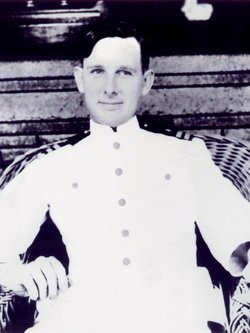Joseph Rochefort
|
|
Captain Joseph John Rochefort (1898–1976) was an American Naval officer and cryptanalyst.
Captain Rochefort was a major figure in the U.S. Navy's cryptographic and intelligence operations from 1925 to 1947. He headed the navy's fledgling cryptanalytic organization in the 1920s and provided superb cryptographic support to the U.S. fleet during World War II, leading to victory in the War in the Pacific. At the end of his Naval career (1942–1946), Rochefort successfully headed the Pacific Strategic Intelligence Group in Washington.
Rochefort was born in 1898 and enlisted in the navy in 1918. He was commissioned an ensign after graduation from the Stevens Institute of Technology. That he had not attended the Naval Academy and was a 'mustang' (ie, ex-enlisted) was perhaps important as partial causes of his difficulties later in WWII. Rochefort's tours ashore included cryptanalytic training under both Captain Laurance Safford and Agnes Meyer Driscoll in 1925; a stint as second chief of the Department of Naval Communications' newly created cryptanalytic organization, OP-20-G, from 1926 to 1929; training in the Japanese language from 1929 to 1932; and a two-year intelligence assignment in the Eleventh Naval District, San Diego, from 1936 to 1938. Until 1941, Rochefort spent nine years in cryptologic or intelligence-related assignments and fourteen years at sea with the U.S. fleet in positions of increasing responsibility.
In early 1941 Laurance Safford, again chief of OP-20-G in Washington, sent Rochefort to Hawaii to become OIC of Station Hypo in Pearl Harbor. The reasons for Rochefort's appointment were obvious: he was an expert Japanese linguist, an experienced and very talented intelligence analyst, and a trained cryptanalyst.
Rochefort handpicked many of Hypo's staff, and by the time of Pearl Harbor, it contained many of the navy's best cryptanalysts, traffic analysts, and linguists, including Thomas Dyer, Wesley A. (Ham) Wright, Joseph Finnegan, General Alva Lasswell, Thomas Huckins, and Jack Williams.
After the Japanese attack, Navy cryptographers attempted to break into Japanese Navy encrypted communications. Station Cast (in the Philippines), Station Hypo (at Pearl Harbor), OP-20-G in Washington, and some support assistance from both British cryptographers (in Hong Kong and later Singapore), and Dutch cryptographers (in the Dutch East Indies), combined to break enough JN-25 traffic to provide useful intelligence reports and assessments regarding Japanese force disposition and intentions in early 1942. How much of this work was done by Station Hypo (in contrast to OP-20-G, Cast, or the British or Dutch) is still controversial, but it is clear that Station Hypo made major, and perhaps the single most critical, contributions. Station Hypo (ie, Rochefort) maintained that the coming Japanese attack would be in the Central Pacific, while OP-20-G (with support from Station Cast) insisted it would be in the North Pacific. There was an 'invasion force' associated with site AF, but where or what as AF was not clear. It was one of the Station Hypo staff, Jasper Holmes, who had the idea of faking a water supply failure on Midway Island with a cleartext emergency warning, provoking Japanese JN-25 traffic on the subject, thus testing whether Midway was a target or not. The Japanese took the bait and broadcast instructions for additional water desalinization equipment to be loaded for the code group for the major attack point, thus confirming a Midway attack. During the month of May 1942, Rochefort and his group decrypted, translated, reviewed, analyzed, and reported as many as 140 decrypted messages per day. Many of these reports went directly to the highest-ranking Fleet commanders, including Admiral Nimitz. There are stories about Rochefort, in his bathrobe, doing 36 hour continuous shifts in Station Hypo's basement offices.
The most significant cryptographic success of Rochefort and his unit was the timely and accurate support provided before the Battle of Midway, allowing Admiral Nimitz to set up the ambush which led to victory and to what many consider the turning point of the Pacific War. Disputes between Rochefort in Hawaii and the new commanders of Op-20-G in Washington (Safford having been reassigned) resulted in Rochefort being detached from intelligence work not long after Midway. He ended the War commanding a dry dock on the US West Coast. When appraised of this much later, Nimitz is said to have strenuously objected. Under new command, Station Hypo and its successors provided useful intelligence for the rest of the Pacific War, but was never as independent of OP-20-G in Washington as it had been under Rochefort.
Rochefort died in 1976. In 1986, he posthumously received the Presidential Medal of Freedom, the highest military award during peacetime, for his cryptographic work in the meriod before the Battle of Midway.

